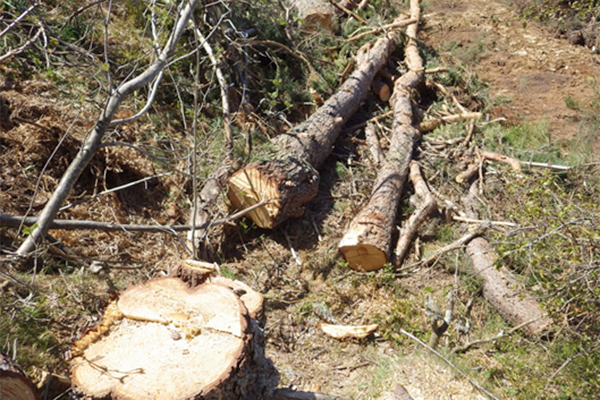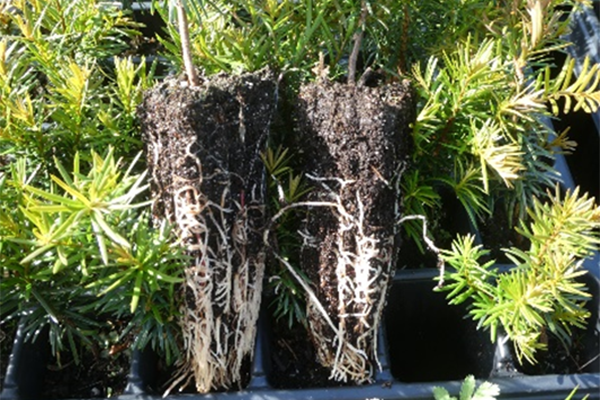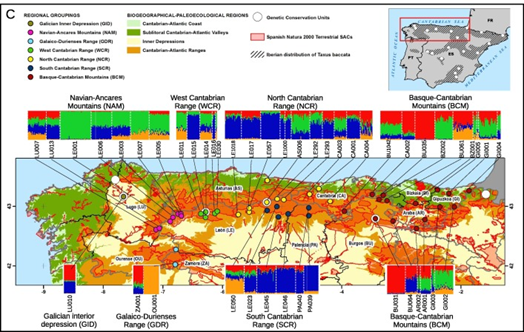Completion of LIFE BACCATA in Galicia: results and impacts of the project
14-12-2021

The execution of LIFE BACCATA in Galicia has fulfilled the objectives set by the project at the beginning, contributing to the improvement of the conservation status of habitat 9580 * in SAC Os Ancares - O Courel (ES1120001), as well as providing an increase of the knowledge about this habitat and the dissemination of its values and conservation needs in different localities and areas.
Taking into account the small area of habitat 9580* in Galicia, and its fragility and vulnerability to the various pressures and threats that have been identified, the actions carried out by the LIFE BACCATA project have been aimed at improving its conservation status through the implementation of measures to increase its surface area, to eliminate conditions altering its composition and to improve its future prospects. IBADER has acted as coordinator of the actions, with the participation of the public company TRAGSA in the execution and technical design of the restoration actions on 9580* habitat in Galicia, which have been located in 15.4 hectares within the common land (MVMC the acronym in Spanish) of Riocereixa (Pedrafita do Cebreiro, Lugo), in SAC Os Ancares - O Courel (ES1120001), which has the presence of 9580* habitat within its territorial scope. The neighbourhood community that owns the MVMC has expressed its support for the project since the proposal, so LIFE BACCATA has executed its strategy for the improvement of habitat 9580* on their properties through the signing of a collaboration agreement. The implementation of LIFE BACCATA in a collective private property has been a great added value to the project, since it allows the private owners of the territory to be involved in the management of natural habitats and Natura 2000, being a pioneering measure in Galicia.
In this way, the project in Galicia has improved the conservation status of 15.4 hectares of 9580* habitat in Riocereixa MVMC, by eliminating a monospecific plantation of the exotic species Pinus sylvestris, in a state of senescence and null conservation value for biodiversity, to be later restored by planting 17,000 plants of the characteristic species of 9580* habitat in Galicia (Taxus baccata, Betula pubescens, Quercus petraea, Fagus sylvatica, Sorbus aucuparia, Ilex aquifolium, Corylus avellana). These actions have been reinforced through their protection against forest fires, by the improvement of 16.9 km of tracks of the Riocereixa MVMC, so that they serve for the establishment of lines of defense against fires, and also avoid being the origin of the fires, allow better access to extinguishing services, and can be used by neighbours for transiting by them.

La restauración del hábitat 9580* mediante la plantación de sus especies características se ha realizado con planta que IBADER ha producido en vivero desde el propio proyecto LIFE BACCATA, de forma que se ha asegurado el empleo de material compatible genéticamente, y de origen local, mediante recogida en el mismo MVMC de Riocereixa de estaquillas y semillas de las especies arbóreas a emplear. De forma complementaria, también se ha recogido material para poner en marcha una colaboración con el grupo de investigación AgroBioTech for Health de la Universidad de Vigo, especializado en bioteconología vegetal, cultivo in vitro, micro y macropropagación, para la propagación vegetativa de plántulas de Taxus baccata mediante técnicas avanzadas de hormonado y bajo condiciones controladas, con la finalidad de emplear esta modalidad como una nueva estrategia medioambiental y de conservación de la especie, arrojando resultados preliminares alentadores.

The restoration of 9580* habitat by planting its characteristic species has been carried out with plants that IBADER has produced in a nursery within the framework of LIFE BACCATA, to guarantee the use of genetically compatible plant material of local origin by collecting from same Riocereixa MVMC cuttings and seeds of the tree species to restore 9580*. In addition, material has also been collected to launch a collaboration with the AgroBioTech for Health research group at the University of Vigo, specialized in plant biotechnology, in vitro culture, micro and macropropagation, for the vegetative propagation of Taxus baccata using advanced hormonal techniques and under controlled conditions, in order to use this modality as a new environmental and conservation strategy for the species, yielding encouraging preliminary results.

To halt the loss of genetic variability of yew in Northern Iberian Peninsula, and thus improve its future prospects, as the main species of 9580* habitat, LIFE BACCATA has carried out a transversal action in Galicia, materialized in various in situ and ex situ conservation measures: genotyping of 1,151 samples from 82 yew localities in the North of the Iberian Peninsula, creation of a germplasm bank that stores the 1,151 tissue samples of DNA and 920 seeds from 7 localities of Galicia and Asturias, creation of an arboretum of Taxus baccata with genetic material from SAC Os Ancares - O Courel (ES1120001), and sharing the genetic information of 49 natural populations of yew (Taxus baccata) with EUFORGEN, to integrate them into its network of Forest Genetic Conservation Units (UCGF the acronym in Spanish).
The execution of all these conservation actions has generated valuable knowledge that has served to be the object of dissemination, publication and exchange with other platforms and entities. Throughout the project, various conferences and seminars for public dissemination have been organized and/or attended, with a special dedication to workshops in primary and secondary education centers. The arrival of COVID-19 has been a special challenge when it comes to holding this type of event, so that the project's dissemination strategy has been transformed into an online content promotion (https://www.youtube.com/ watch? v = y5_uWIDYoZ0), complemented by evaluation materials, which were distributed in 24 workshops for 950 schoolchildren on yew tree and yew forest conservation, Natura 2000 and LIFE BACCATA, taught in 16 primary and secondary education centers from 11 municipalities of Lugo province.

The genotyping data has served for the publication of the article "Genetic diversity and structure of Taxus baccata from the Cantabrian-Atlantic area in northern Spain: A guide for conservation and management actions", published in Volume 482 of Forest Ecology and Management, prestigious magazine of the forestry field. However, the data used in that article has been shared with the Center for Ecological Research and Forestry Applications (CREAF), allowing broadening the contextualization of the project results, and being used in the article “Shaping the niche of Taxus baccata, a modeling exercise using biologically meaningful information ”, published in Volume 501 of Forest Ecology and Management.
The production of plants of local and compatible origin has generated valuable knowledge that has been transferred, for its replication, to public administrations, NGOs and companies in the forestry sector, both at the local, regional, and national levels, as well as from other EU member states such as France, Ireland, Portugal and Italy, enabling exchange with other European projects, both LIFE and non-LIFE. In this case, the arrival of COVID-19 also had a great impact on the initial forecasts, so that visits to projects and entities at European level have been replaced by online networking seminars, which has resulted in a greater project impact since it has enabled a greater number of agents involved to participate in them, and therefore receive and exchange the results and lessons learned by the project.
Taking into account the small area of habitat 9580* in Galicia, and its fragility and vulnerability to the various pressures and threats that have been identified, the actions carried out by the LIFE BACCATA project have been aimed at improving its conservation status through the implementation of measures to increase its surface area, to eliminate conditions altering its composition and to improve its future prospects. IBADER has acted as coordinator of the actions, with the participation of the public company TRAGSA in the execution and technical design of the restoration actions on 9580* habitat in Galicia, which have been located in 15.4 hectares within the common land (MVMC the acronym in Spanish) of Riocereixa (Pedrafita do Cebreiro, Lugo), in SAC Os Ancares - O Courel (ES1120001), which has the presence of 9580* habitat within its territorial scope. The neighbourhood community that owns the MVMC has expressed its support for the project since the proposal, so LIFE BACCATA has executed its strategy for the improvement of habitat 9580* on their properties through the signing of a collaboration agreement. The implementation of LIFE BACCATA in a collective private property has been a great added value to the project, since it allows the private owners of the territory to be involved in the management of natural habitats and Natura 2000, being a pioneering measure in Galicia.
In this way, the project in Galicia has improved the conservation status of 15.4 hectares of 9580* habitat in Riocereixa MVMC, by eliminating a monospecific plantation of the exotic species Pinus sylvestris, in a state of senescence and null conservation value for biodiversity, to be later restored by planting 17,000 plants of the characteristic species of 9580* habitat in Galicia (Taxus baccata, Betula pubescens, Quercus petraea, Fagus sylvatica, Sorbus aucuparia, Ilex aquifolium, Corylus avellana). These actions have been reinforced through their protection against forest fires, by the improvement of 16.9 km of tracks of the Riocereixa MVMC, so that they serve for the establishment of lines of defense against fires, and also avoid being the origin of the fires, allow better access to extinguishing services, and can be used by neighbours for transiting by them.

La restauración del hábitat 9580* mediante la plantación de sus especies características se ha realizado con planta que IBADER ha producido en vivero desde el propio proyecto LIFE BACCATA, de forma que se ha asegurado el empleo de material compatible genéticamente, y de origen local, mediante recogida en el mismo MVMC de Riocereixa de estaquillas y semillas de las especies arbóreas a emplear. De forma complementaria, también se ha recogido material para poner en marcha una colaboración con el grupo de investigación AgroBioTech for Health de la Universidad de Vigo, especializado en bioteconología vegetal, cultivo in vitro, micro y macropropagación, para la propagación vegetativa de plántulas de Taxus baccata mediante técnicas avanzadas de hormonado y bajo condiciones controladas, con la finalidad de emplear esta modalidad como una nueva estrategia medioambiental y de conservación de la especie, arrojando resultados preliminares alentadores.

The restoration of 9580* habitat by planting its characteristic species has been carried out with plants that IBADER has produced in a nursery within the framework of LIFE BACCATA, to guarantee the use of genetically compatible plant material of local origin by collecting from same Riocereixa MVMC cuttings and seeds of the tree species to restore 9580*. In addition, material has also been collected to launch a collaboration with the AgroBioTech for Health research group at the University of Vigo, specialized in plant biotechnology, in vitro culture, micro and macropropagation, for the vegetative propagation of Taxus baccata using advanced hormonal techniques and under controlled conditions, in order to use this modality as a new environmental and conservation strategy for the species, yielding encouraging preliminary results.

To halt the loss of genetic variability of yew in Northern Iberian Peninsula, and thus improve its future prospects, as the main species of 9580* habitat, LIFE BACCATA has carried out a transversal action in Galicia, materialized in various in situ and ex situ conservation measures: genotyping of 1,151 samples from 82 yew localities in the North of the Iberian Peninsula, creation of a germplasm bank that stores the 1,151 tissue samples of DNA and 920 seeds from 7 localities of Galicia and Asturias, creation of an arboretum of Taxus baccata with genetic material from SAC Os Ancares - O Courel (ES1120001), and sharing the genetic information of 49 natural populations of yew (Taxus baccata) with EUFORGEN, to integrate them into its network of Forest Genetic Conservation Units (UCGF the acronym in Spanish).
The execution of all these conservation actions has generated valuable knowledge that has served to be the object of dissemination, publication and exchange with other platforms and entities. Throughout the project, various conferences and seminars for public dissemination have been organized and/or attended, with a special dedication to workshops in primary and secondary education centers. The arrival of COVID-19 has been a special challenge when it comes to holding this type of event, so that the project's dissemination strategy has been transformed into an online content promotion (https://www.youtube.com/ watch? v = y5_uWIDYoZ0), complemented by evaluation materials, which were distributed in 24 workshops for 950 schoolchildren on yew tree and yew forest conservation, Natura 2000 and LIFE BACCATA, taught in 16 primary and secondary education centers from 11 municipalities of Lugo province.

The genotyping data has served for the publication of the article "Genetic diversity and structure of Taxus baccata from the Cantabrian-Atlantic area in northern Spain: A guide for conservation and management actions", published in Volume 482 of Forest Ecology and Management, prestigious magazine of the forestry field. However, the data used in that article has been shared with the Center for Ecological Research and Forestry Applications (CREAF), allowing broadening the contextualization of the project results, and being used in the article “Shaping the niche of Taxus baccata, a modeling exercise using biologically meaningful information ”, published in Volume 501 of Forest Ecology and Management.
The production of plants of local and compatible origin has generated valuable knowledge that has been transferred, for its replication, to public administrations, NGOs and companies in the forestry sector, both at the local, regional, and national levels, as well as from other EU member states such as France, Ireland, Portugal and Italy, enabling exchange with other European projects, both LIFE and non-LIFE. In this case, the arrival of COVID-19 also had a great impact on the initial forecasts, so that visits to projects and entities at European level have been replaced by online networking seminars, which has resulted in a greater project impact since it has enabled a greater number of agents involved to participate in them, and therefore receive and exchange the results and lessons learned by the project.



